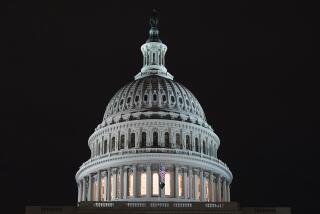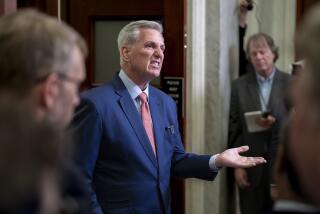Obama ‘modestly optimistic’ on plan to avert ‘fiscal cliff’
WASHINGTON — The prospects for avoiding a New Year’s Day tax increase on nearly all American wage earners improved substantially Friday after congressional leaders met at the White House and declared they would work toward a bill to avoid part of the so-called fiscal cliff.
After an hourlong afternoon session with the leaders of the House and Senate, President Obama told reporters he was “modestly optimistic” that a deal could be reached before the Monday deadline.
The tone at the White House and on Capitol Hill marked an abrupt shift from the steadily worsening relations of the past several weeks.
The change could be seen on the Senate floor, as Majority Leader Harry Reid of Nevada and Republican leader Mitch McConnell of Kentucky said they would work together to come up with a compromise to present to their party caucuses on Sunday afternoon. If that works, the Senate would prepare to vote on Monday, Reid said.
The day before, Reid had angrily accused Republicans of stalling on a deal, and McConnell had accused Obama of not engaging in timely negotiations. This time, McConnell said he was “hopeful and optimistic” about the outcome.
Any agreement at this point would fall substantially short of the “grand bargain” to cut the government’s long-term deficit that Obama and House Speaker John A. Boehner (R-Ohio) have tried unsuccessfully to negotiate. That effort aimed to slice deficits by $4 trillion over a decade. This deal would do less than half that.
The package would not address spending on Social Security or Medicare, which Republicans have sought to restrict, nor would it raise the government’s debt ceiling, which would have to be dealt with again by early spring. It probably would not delay the across-the-board cuts in defense spending and domestic programs that are scheduled to begin in the new year, although Congress could act to defer them.
If a deal passes, according to officials with knowledge of the negotiations, it would hand Obama a victory on a key goal — raising taxes for upper-income Americans while leaving George W. Bush-era income tax rates intact for everyone else.
Economists have warned that sharp increases in tax rates for everyone and steep cuts in government spending could harm the economy, pushing up unemployment and perhaps triggering a new recession. White House officials have been keen to avoid that by limiting the tax increase to the top 2% or less of taxpayers.
Obama sought to keep pressure on lawmakers, saying that if the negotiators cannot reach a deal, he wants Reid to allow an up-or-down vote on his basic proposal to protect middle-class taxpayers from seeing their taxes rise. That would put Senate Republicans in the uncomfortable position of filibustering a middle-class tax cut as they attempted to block the bill.
“The hour for immediate action is here. It is now,” Obama said. “If members of the House or the Senate want to vote no, they can. But we should let everybody vote. That’s the way this is supposed to work.”
“The American people are not going to have any patience for a politically self-inflicted wound to our economy,” Obama said. “Not right now.”
Obama also is scheduled to appear Sunday on NBC’s “Meet the Press.”
The income threshold for tax rate increases remained under negotiation. White House officials have advocated the $250,000 limit that Obama discussed in the presidential campaign, but that level is too low for many senators.
Some Republicans in both chambers have indicated they could live with a higher tax rate on incomes above $400,000 or $500,000. Such a figure also would please Senate Democrats from states with high costs of living, including California and New York, who have argued that a $250,000 income does not necessarily make a household wealthy in their states.
One key aim for negotiators is to find an income threshold that could draw enough Republican support for Boehner to win over a majority of his caucus — 120 members — while attracting the remaining Democrats needed for passage. Boehner has resisted bringing a bill to the floor without the support of most House Republicans.
Another point of contention has been the level for estate taxes. Republicans want to keep the current 35% tax rate on estates worth more than $5 million. Many Democrats want a 45% rate on estates worth more than $3.5 million. If Congress does not act, the tax automatically reverts to its 1990s level of 55% on estates worth more than $1 million.
“There are certain things in which you begin losing a lot of real votes quickly, including mine — and fussing with the estate tax is one of them,” said retiring Sen. Jon Kyl of Arizona, the second-ranking Senate Republican.
The package also could include provisions to extend federal benefits for the long-term unemployed, which are set to expire this weekend, and to fix the alternative minimum tax, which under current law would suddenly expand to affect about 30 million taxpayers rather than the 4 million it now covers.
Negotiators could include other items, including the level of Medicare payments for doctors and price supports for milk, as they try to clean up issues that have been caught up in the overall congressional stalemate this year.
Throughout the day Friday, senators appeared to have as little information as most of the rest of the country, even as they met behind closed doors for their weekly luncheons.
Groups of senators had been working the floor all day, asking one another what it would take to strike a deal.
“Everyone’s talking,” said Sen. Kay Bailey Hutchison (R-Texas), who is retiring in a few days. “What could the House live with? What could we all live with? What’s your biggest give? What’s your absolute drop dead? There’s a lot of that talk going on.”
Despite Friday afternoon’s optimism, many senators remained skeptical that a compromise could clear both chambers.
“The fact that they left with some positive views is certainly encouraging,” said Sen. Benjamin L. Cardin (D-Md.). “I think the Senate is a body where you could have a reasonable compromise…. The House — no, I don’t have that same optimism in the House.”
As lawmakers hunkered down for a weekend in Washington, Sen. Jim Risch (R-Idaho) said: “This thing’s been going on for so long, I think any optimism or pessimism is misplaced.”
kathleen.hennessey@latimes.com
David Lauter and Michael A. Memoli in Washington contributed to this report.
More to Read
Start your day right
Sign up for Essential California for news, features and recommendations from the L.A. Times and beyond in your inbox six days a week.
You may occasionally receive promotional content from the Los Angeles Times.








